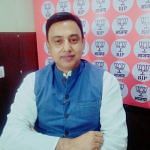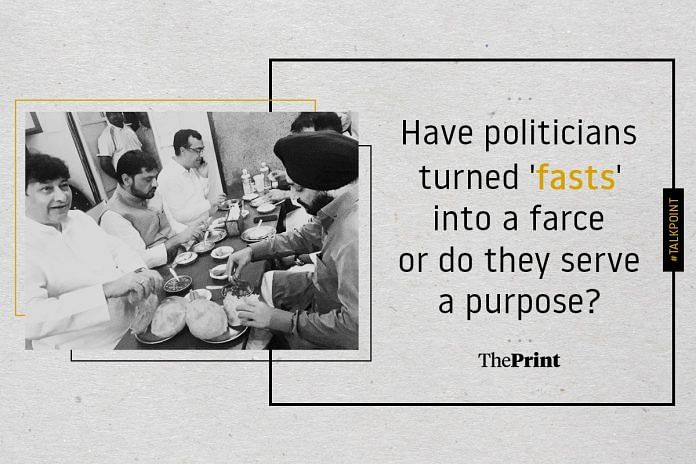Chief minister Chandrababu Naidu is on a one-day hunger strike to protest against the Centre’s refusal to grant special status to Andhra Pradesh. Prime Minister Narendra Modi, Rahul Gandhi, Anna Hazare, and Delhi Commission for Women chief Swati Maliwal have all taken to fasting recently to protest against a range of issues.
However, pictures of Congress leaders eating chhole bhature and BJP leaders snacking created much controversy.
ThePrint asks: Have politicians turned ‘fasts’ into a farce or do they serve a purpose?
When those in the government fast, it is just absurd
 Ajay Maken
Ajay Maken
President, Delhi Congress
Fasting is a tradition that has been practised for decades in Indian politics. It is a symbolic act that highlights pertinent issues in a peaceful and democratic manner. These issues, which otherwise may have been ignored, thus get the limelight they deserve. Necessary debate follows the act of fasting.
In 1990, I was an activist who participated in the iconic fast undertaken by Rajiv Gandhi against the union government. Recently, Rahul Gandhi too raised his voice against the Centre by fasting. Fasting is the prerogative of the Opposition to draw attention towards unfair policies. Be it the Congress, the BJP, or the AAP, whoever is in the opposition has often taken this route to protest.
We shouldn’t, however, make a mockery of the act of fasting. The infamous dance of Sushma Swaraj in Rajghat while on a dharna is one such example. I know Congress’ meal before the fast has been a controversial issue, but we weren’t trying to hide anything. We had a meal, yes. But it was four-five hours before the strike. However, on the other hand, BJP members were caught snacking during the fast. That is highly inappropriate.
Moreover, when the Prime Minister or a chief minister fast, it seems absurd. The Congress fully supports Chandrababu Naidu’s claim (for special status for Andhra). But as for the PM, it is his duty to deliver. They can’t fast. That just begs the question, against whom are they fasting? Themselves?
Fasts are a symbolic means to start a debate around relevant issues. They shouldn’t be used by the government. That just makes a mockery of the entire system.
For Rahul Gandhi and Naidu, fasting is a political gimmick to mislead people
 Syed Zafar Islam
Syed Zafar Islam
National spokesperson, BJP
Fasting, but with a sound moral reason, is most certainly a good method to peacefully highlight unfair practices and issues. All political parties must practice this method.
On the other hand, fasting with the sole intent to mislead people and play with their sentiments is completely despicable. Unfortunately, this the most common form of ‘fasting’ that we see in India.
Rahul Gandhi’s fast was a complete farce. Once pictures of party leaders stuffing themselves with chhole bhature began to emerge, they stood exposed. It was a political gimmick, and not even a good one. The people of India realised that what the Congress did was a complete sham.
In contrast, our Prime Minister observed a day of abstinence to highlight how uncooperative the opposition had been in Parliament, especially in the Rajya Sabha. They have created a bottleneck and refuse to conduct business on the floor of the house. Now, that is a commendable reason to fast.
What the TDP is doing is another misbegotten attempt to mislead people. They have a grudge that Andhra Pradesh hasn’t been granted special status. Special status can’t be granted to any state anymore. The Finance Commission has done away with it. But they have been provided a special package and all the requisite financial assistance, same as that which used to be provided to states with the ‘special status’ tag.
Chandrababu Naidu is resorting to unfair tactics because he knows he is losing ground in Andhra Pradesh. It makes a mockery of the act of fasting.
Congress and BJP have dented the legitimacy of fasting as a form of political protest
 Akshay Marathe
Akshay Marathe
Spokesperson, Aam Aadmi Party
As a member of a party born out of the indefinite fast held by Anna Hazare and Arvind Kejriwal in 2011, there’s no doubt in my mind that hunger strikes are effective tools for building political pressure. In fact, many are unaware of the fact that Kejriwal became the undisputed leader of Delhi’s poor when he fasted for 14 days in March 2013 against the rising electricity and water prices. The fast sealed Kejriwal’s identity as the man who would fix Delhi’s power and water problems.
Unfortunately, the recent fasts by Congress leaders as well as BJP MPs, led by Prime Minister Modi, have certainly dented the legitimacy of this form of protest for two reasons: One, fixed-period fasts look insincere and self-serving; two, both fasts were for vague and superficial reasons. Why should ordinary people support a politician fasting for something that has no link to concerns regarding their everyday lives? And if fasts do not mobilise support among people, what purpose are they serving?
Juxtapose the fasts by Congress and BJP leaders with Delhi Commission for Women chief Swati Maliwal’s fast unto death for stricter laws against child rape. Swati’s demands may or may not be met, but her campaign is resonating with the people because she is a known crusader for women’s rights and is truly putting her life at stake for a cause that affects each person’s life.
Satyagraha is an indistinguishable part of Indian politics and it is here to stay.
Present politicians lack moral authority, it doesn’t matter if they fast
 Rajgopal Singh
Rajgopal Singh
Reporter, ThePrint
The potency of fasting as a method of protest is in terminal decline. In over a decade, when was the last time a fast achieved its logical conclusion? I doubt many instances will come to your mind.
In his five decades of public life, Gandhi fasted more than a dozen times. Nearly all his attempts achieved the stated goal. The question is — why?
In an interview with Shekhar Gupta, BJP leader Arun Shourie explained why the current lot of BJP leaders is not taken seriously. He said an eye-roll from either Mahatma Gandhi or Sardar Patel was enough to bring pin-drop silence. These leaders had moral authority.
Delhi chief minister Arvind Kejriwal sat on many fasts. So many, that he eventually changed the end objective of the fast midway. During India Against Corruption, the goal changed from forcing political parties to bring Lokpal, to forming a party of his own.
Then, there was Anna Hazare’s series of fasts starting in 2011 for Jan Lokpal. Lokpal has still not seen the light of day. The same Anna Hazare sat on another indefinite fast last month in Delhi for farmers’ rights, corruption, and electoral reforms. It was a damp squib.
A few hours or a day of fast by elected chief ministers and prime ministers are nothing more than a fashion statement now.
Compiled by Deeksha Bhardwaj, journalist at ThePrint.



